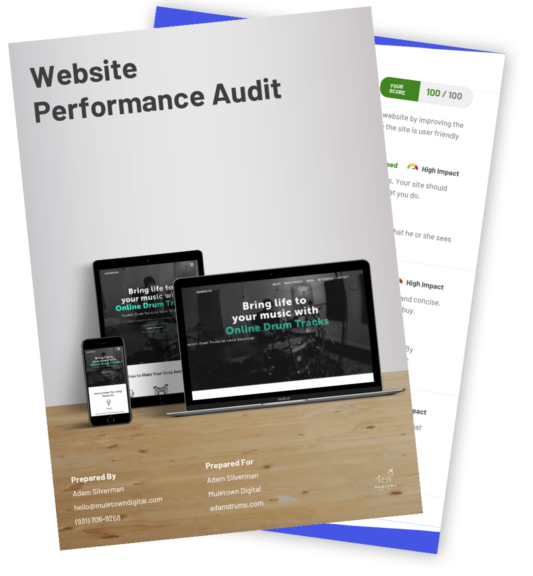Dangers of DIY Website: The Hidden Costs of Going Solo | Muletown Digital
As a small business owner, it’s easy to get caught up in the idea of saving money wherever possible, especially when it comes to your website. After all, there are so many DIY website builders available today, offering quick solutions at an affordable price, and the ability to host your content and services easily. But while these tools can seem tempting, they often do more harm than good in the long run.
Investing in a professional web design and development team is essential for any business looking to thrive online, especially in a competitive digital landscape. Professional services provide access to exclusive features and essential tools, such as advanced SEO settings, customization options, and member-only content capabilities. Let’s take a look at why opting for DIY websites or hiring cheap freelancers could cost you more than you think, and why partnering with a professional team will help you achieve long-term success.
Introduction to Website Building
Creating a website can be a daunting task, but with the right tools and resources, it can be a fun and exciting experience. A website builder is a software tool that allows users to create and design their own website without requiring any coding knowledge. There are many website builders available, including free website builders and paid ones, each with their own set of features and tools. Various apps can enhance website functionality, simplifying website creation, improving business management, and providing valuable marketing tools. When choosing a website builder, it’s essential to consider the type of website you want to create, the level of customization you need, and the budget you have. Some popular website builders include Wix, Squarespace, and Webnode, which offer a range of templates, drag-and-drop editors, and built-in marketing tools to help you create a professional-looking website. These platforms streamline the website creation process, making it easier for users to build and manage their websites efficiently.
The Myth of the “Cheap and Easy” Website
We’ve all heard the pitch: build your website quickly and affordably with DIY platforms like Wix, Squarespace, or GoDaddy’s AI-driven tools. These platforms promise you can get your site up and running in no time, encouraging you to start building your online presence quickly. Evaluating and testing various website builders can help users build sites effectively by focusing on ease of use, customization options, and SEO tools. But what happens when it’s time to scale, grow, or, more importantly, make money?
Many small businesses, in an effort to save money, end up choosing the DIY route. The thought process is simple: Why pay a professional when you can do it yourself? However, this way of thinking overlooks one critical detail: your website is not just an online brochure; it’s a tool for making money. And if your website isn’t built correctly, it could cost you more than you ever intended.

Hidden Costs of DIY Websites
The biggest issue with DIY websites is that they often come with hidden costs that aren’t immediately apparent. Seeking expert advice can help you avoid these hidden costs. While DIY website builders may offer initial inspiration with their templates and tools, the hidden costs can outweigh these benefits. Let’s break down some of these costs:
1. Low-Performance Sites = Low Conversion Rates
A DIY website often lacks the optimization and user experience (UX) necessary for driving conversions. Selecting harmonious color palettes is crucial to enhance the professional look of a site. From page load times to mobile responsiveness, DIY websites tend to have performance issues that could turn visitors away before they even have a chance to see what you offer.
Most DIY tools offer pre-built templates that may look appealing at first, but when it comes to performance, they’re often overcomplicated with unnecessary elements that slow your site down. As a result, your website won’t perform well on search engines or drive the leads you need to succeed.
2. Wasted Time and Effort
You’re a business owner with a million things to do. Planning and executing website projects effectively is crucial to avoid wasting time and effort. Without any coding experience, you may find yourself spending countless hours trying to figure out how to build a website, write copy, design graphics, and optimize it for search engines. Why waste valuable hours on these tasks when you could be focusing on your core business activities?
By investing your time in building a website, you’re sacrificing time you could be using to focus on your business growth, customer relationships, and the tasks that make you money. And let’s face it, most people aren’t professional website designers or marketers, which means you’re likely to spend far more time than you think—and end up with a less-than-stellar result.
3. Technical Issues and Problems Under the Hood
DIY websites tend to have numerous technical problems that will inevitably cause headaches down the road. Many intuitive website builders minimize the need for HTML knowledge, making it easier for users without coding experience to create a website. Even after you manage to publish your DIY website, technical issues can arise that are difficult to fix without professional help. From broken links and poor code to unoptimized images and slow load times, these problems only get worse over time.
A website that isn’t properly built can suffer from technical issues that are difficult to fix without professional help. For example, Google’s algorithms look for websites with clean, error-free code that’s optimized for both mobile and desktop users. If you don’t have these elements in place, your website won’t rank well, and your potential customers won’t find you.
4. Lost Revenue and Missed Opportunities
Most businesses have an online presence to make money—whether that’s through e-commerce, lead generation, or attracting new clients. A professional web team can build a website that includes essential elements like a contact page, strategically designed to generate leads and sales. If your website isn’t performing as it should, it’s likely losing you sales, leads, or opportunities to connect with your audience.
A professional web team can build a website that’s strategically designed to generate leads and sales. They’ll incorporate proven strategies for conversion rate optimization (CRO), ensuring that every aspect of the site—from the design to the call-to-action buttons—is working toward achieving your business goals.
5. SEO Struggles and Search Engine Penalties
Search engine optimization (SEO) is crucial for your website’s visibility on Google and other search engines. DIY website builders often leave SEO optimization to chance, making it difficult for your site to rank well on search engine result pages (SERPs). They also lack comprehensive SEO tools and articles that provide in-depth resources and guides for optimizing your site.
A poorly optimized website can even lead to penalties from Google, resulting in a drop in rankings and a loss of organic traffic. A professional web team, on the other hand, will create a website with SEO best practices built in from the start, ensuring that your site is visible to the right audience and ranks highly for the terms that matter to your business.

Website Builder Features
A good website builder should have a range of features that make it easy to create and customize your website. Some essential features to look for include a drag-and-drop editor, customizable templates, SEO tools, and built-in marketing tools. A drag-and-drop editor allows you to add and arrange elements on your website without needing to write any code. Customizable templates give you a starting point for your website’s design, and SEO tools help you optimize your website for search engines. Built-in marketing tools, such as email marketing and social media integration, can help you promote your website and reach a wider audience. Additionally, look for a website builder that offers a free domain, unlimited bandwidth, and reliable hosting to ensure your website is always available.
Customization and Control: The Illusion of Flexibility
When using a free website builder, it’s essential to consider the level of customization and control you have over your website. While many website builders offer drag and drop editors and customizable templates, the reality is that you’re often limited to working within the parameters set by the builder. This can be frustrating for users who want more flexibility and control over their website’s design and functionality. Additionally, the built-in marketing tools and SEO settings may not be enough to help you achieve your online goals. To truly succeed, you may need to look beyond the basics and explore more advanced marketing strategies.
Design and Templates: The Limitations of Pre-Made Options
Website templates can be a great starting point for creating a website, but they can also be limiting. Many free website builders offer a range of pre-made templates, but these templates may not be fully customizable, and you may find that your website looks like many others. Furthermore, the design options may be restricted, and you may not be able to create a truly unique and professional-looking website. To stand out from the crowd, you may need to consider hiring a developer or using a more advanced website builder that offers greater flexibility and control.
Ecommerce and Online Stores
If you want to sell products or services online, you’ll need an ecommerce website. An ecommerce website builder should have features such as online store templates, payment gateways, and inventory management tools. Some popular ecommerce website builders include Shopify, BigCommerce, and WooCommerce. When choosing an ecommerce website builder, consider the type of products you want to sell, the payment gateways you need, and the level of customization you require. You should also look for a website builder that offers SEO tools, such as customizable meta tags and product descriptions, to help your online store rank higher in search engines. With the right ecommerce website builder, you can create a professional-looking online store and start selling products quickly and easily.
The Cost of Hiring a Professional Web Design Team
It’s tempting to look at the price tag of hiring a professional web team and feel like it’s an expense you can’t afford. In the competitive market of site builders, professional web design teams offer capabilities that can significantly enhance your website. But here’s the truth: When you hire a professional web developer, you’re making an investment that pays for itself over time.
ROI on Professional Web Design
The key to a successful website is that it should not be viewed as a cost on your balance sheet but as an asset that drives revenue. A well-designed website is built to attract traffic, generate leads, and convert those leads into sales. A professional web team brings a wealth of skills to the table, ensuring that your website is designed to attract traffic, generate leads, and convert those leads into sales. With professional web development, you’re not just paying for a website—you’re paying for a strategic tool that will help your business grow.
- Improved Conversion Rates: A professional web team knows how to design your site for maximum conversions. They’ll ensure that your website guides visitors smoothly from discovery to purchase, whether that means adding trust signals, improving the user flow, or integrating high-converting landing pages.
- Ongoing Support and Optimization: Unlike a DIY website, which requires you to troubleshoot any issues yourself, a professional team will handle ongoing support, maintenance, and optimization. This means fewer headaches for you and a website that’s always running smoothly.
SEO and Performance: With a focus on long-term visibility and performance, a professional team ensures that your website is built to rank well on search engines and loads quickly, even on mobile. This is crucial for bringing in organic traffic and ensuring a positive user experience.
The Time Factor: How Much Time Does DIY Really Save?
Many DIY website builders claim that you can create a site in a few hours or days. But in reality, the process takes much longer than most people anticipate—especially if you want to do it right. Be inspired by examples and collections of user-created sites to draw motivation and stay current with design trends.
From researching the right tools to choosing templates and plugins, and then creating content, the time adds up. Practical examples of effective website designs can help streamline this process, but it still requires significant effort. A professional web design team can complete your project faster and more efficiently, saving you weeks of work while delivering a polished final product.
Common DIY Website Mistakes
DIY Website Mistake #1: Outdated or Poor Design
Many DIY websites end up looking like they were designed in the early 2000s, lacking the modern style and visual appeal that a professional team can provide. To avoid these issues, sign up for a website builder platform that offers modern templates and tools. A professional team will ensure that your website is modern, visually appealing, and on-brand.
DIY Website Mistake #2: Poor User Experience (UX)
Your website’s UX is crucial for keeping visitors engaged and converting them into customers. A professional team will create a site that’s easy to navigate and provides a smooth user journey.
DIY Website Mistake #3: Not Mobile-Friendly
With more and more people browsing the web on mobile devices, a responsive design is essential. A professional web team will ensure that your site looks great and functions properly on all devices.
Launching and Maintaining Your Website
Once you’ve created your website, it’s essential to launch and maintain it properly. Sharing project videos and tips can significantly enhance community engagement and user interaction. This includes setting up a custom domain, configuring SEO settings, and creating high-quality content. You should also regularly update your website with fresh content, respond to customer inquiries, and monitor your website’s performance using analytics tools such as Google Analytics. Additionally, consider using social media marketing tools to promote your website and engage with your audience. By following these steps, you can ensure your website is successful and continues to attract and retain customers over time. Remember to always keep your website up-to-date, secure, and backed up to prevent any losses. With the right website builder and maintenance strategy, you can create a successful online presence and achieve your business goals.
Why DIY Websites Fail: A Real-Life Example
Recently, a client reached out after building a DIY website using GoDaddy’s AI builder. They had also attempted to integrate a blog, but it failed to attract engagement. The website looked good on the surface, but after launching, they saw a dramatic drop in leads and overall engagement. Upon further inspection, we realized that Google had flagged their website for being AI-generated, which hurt their SEO rankings.
This is a prime example of how saving money upfront with DIY tools can lead to much bigger problems down the line. In this case, they not only lost potential customers but had to invest in a complete website rebuild and SEO overhaul to get back on track.
Avoid the DIY Trap
Before jumping into a DIY website project, ask yourself: Is this really the best use of my time and resources? Engaging with a community where you can share ideas might provide better insights and support. If your goal is to grow your business and increase your revenue, then investing in a professional web team is the smart choice.

Conclusion: Weighing the True Costs of DIY Websites
While DIY websites can be a cost-effective way to create an online presence, they may not be the best option for everyone. The true costs of DIY websites go beyond the initial cost of the website builder and hosting. You need to consider the time and effort required to create and maintain a website, as well as the potential limitations and restrictions of using a free website builder. Additionally, you may need to consider the cost of hiring a developer or using more advanced website builders to achieve your online goals. By weighing the true costs of DIY websites and considering your options carefully, you can make an informed decision that’s right for your business or personal needs. Whether you’re looking to create a simple blog or a complex online store, there are many website builders and marketing tools available to help you succeed online. With the right tools and strategies, you can create a successful online presence that drives real results and helps you achieve your goals.
Are you struggling to generate leads off of your website?
Ready to turn SEO challenges into opportunities? At Muletown Digital, we know that every missed keyword and technical glitch can hold back your growth. Let our expert team help you fine-tune your strategy—from targeted keyword research to flawless site performance and engaging content that converts. Invest in your online future today and contact us to unlock your website’s full potential.
Other Helpful Digital Marketing Insights
© Copyright 2025 Muletown Digital, LLC. All Rights Reserved.

